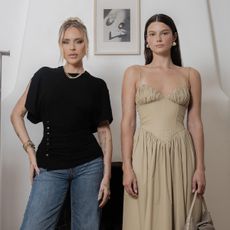Black British Fashion Creatives Reflect One Year On From the Protests
"What next?" is the question many have grappled with since the Black Lives Matter protests reached a fever pitch across the world last year. On 25 May 2020, George Floyd's devastating murder sparked necessary conversations about systemic racism across all areas in society, and the fashion and creative industries were far from exempt. Like many, I witnessed Black fashion designers, creatives, CEOs, influencers and more using their platforms to highlight the need for a diverse workforce whilst also urging for a seat at the table. It was and still is exhausting work.
A year later, Black people and allies are examining the lasting impact of the petitioning and protests over the past 365 days, amidst an ongoing pandemic. In the fashion and beauty industry, notable gestures towards change included Black Pound Day, an initiative encouraging people to support Black independent businesses, and Glossier's massive donation of 500k in grants to Black-owned beauty businesses. Meanwhile on social media, the Influencer Pay Gap created by Adesuwa Ajayi highlighted the stark differences in pay between white and minority ethnic creators.
While fashion has long had ties to political protests, I'm one of the many who noted Instagram's "blackout squares" on Blackout Tuesday were in danger of being performative. To see how the fashion industry has responded this past year, I asked six Black creatives what changes they've witnessed and, importantly, what's next.
Onyi Moss, Content Creator, Fashion Influencer
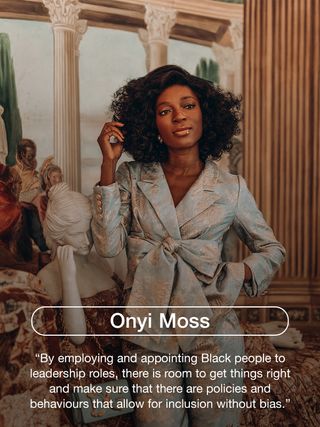
What does fashion mean to you?
For me, fashion is an art of self-expression, a medium to relay a feeling or a mood in order to tell a story.
What have you achieved in the last year that you're proud of?
One key achievement that has come about in the last year is carving out time to rest and reflect. In the creative/influencer industry, being "booked and busy" is usually glamorised, and the burnout that occurs as a result of this is not often put in the forefront for all to see. In my reflections, I found peace in rest. I learnt to say no to things that don't serve me as well as realise the value I bring to my work, which means I'm able to command what I'm worth and more where possible without compromising on carving out time for rest and recharge.
In your opinion, did the events of the last year—George Floyd and the Black Lives Matter protests—impact your career going forward? Were any changes felt?
Yes, they did. I was one of the black creatives who were highlighted on social media at the height of the BLM activism taking place on social media to shake up the fashion and beauty industry, who have been complacent over the years in hiring Black employees, creatives and influencers.
My Instagram following nearly doubled as well as my engagement. In the initial stages, many brands pledged solidarity and made promises, which, upon reflection, haven't really been acted on. At first, I got an influx of brands wanting to work with me, but many failed to even offer payment, let alone meet my rate. As I'm well aware of my worth, I declined such proposals.
Almost immediately, some of the folks who were quick to follow began to unfollow, which other Black creators have shared similar experiences.
I'd say the main impact for me was getting to discover other Black businesses and creatives. I have since made an effort to shop more from Black businesses as well as highlight them. I've also built relationships with other Black creatives I discovered during this time, and I'm currently working on a film series with some of them to highlight the soft side of the Black woman that the media doesn't often show us.
There's still a lot of work that needs to be done, as many brands have returned to their old ways.
A year later, what actions would you like to see beyond performative social media posts going forward?
I'd love to see brands use the #pulluporshutup model as a measure for real change. By employing and appointing Black people to leadership roles, there is room to get things right and make sure that there are policies and behaviours that allow for inclusion without bias.
Black-owned fashion recommendation:
Hats are my go-to statement pieces, so I always recommend them. Some of my favourite Black-owned businesses include Shop A.Au, Brother Vellies and Fanm Djanm.
Daniel Peters, Menswear Designer, Founder of Fashion Minority Report
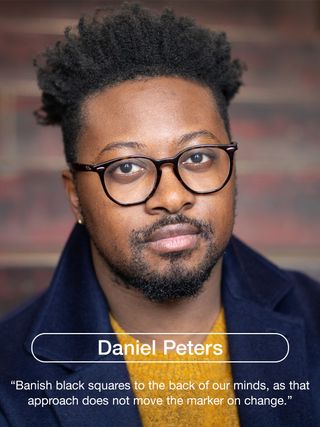
What does fashion mean to you?
Fashion is functional, but fashion can also create a sense of escapism. We use fashion as a way to project who we are, and whether quietly or loudly in some people's eyes, we use it as a medium to create our own sense of reality.
What have you achieved in the last year that you're proud of?
I couldn't be more proud of launching the Fashion Minority Report as a way to bridge gaps and create equality for marginalised communities—in particular, for Black and Brown voices who are often underrepresented in a corporate fashion and creative setting.
In your opinion, did the events of the last year—George Floyd and the Black Lives Matter protests—impact your career going forward? Were any changes felt in the industry?
I feel that I wouldn't be sitting here as a diversity and inclusion strategist if it weren't for the impact that the global protests had on so many of us. We've all begun to change our behaviour and approach to being advocates for change, in particular, for Black and Brown people who have been rallying for centuries to be seen as equal.
A year later, what actions would you like to see beyond performative social media posts going forward?
Banish black squares to the back of our minds, as that approach does not move the marker on change. As everyday change-makers in the workplace, in friendship circles and at home, we need to challenge the issues that we see—in particular, the challenges that face marginalised people. The work has begun, but we need to get to a point of actionable and measurable change that holds us all accountable as a society.
Pariss Cozier, Founder of Chaos
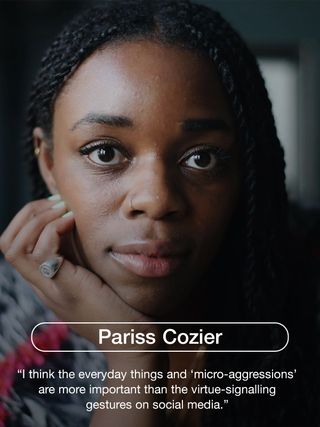
What does fashion mean to you?
This is an interesting question for me at the moment. When I was younger, fashion meant a lot to me—it was aspirational, a way to dream and express myself. Today, it means a broken system that is bolstered by postcolonialism. Supply chains are almost identical to the slave trade routes of 150 years ago. This runs deep, so when we talk about diversity and representation, it extends just beyond the model. This discussion needs to include the maker, too.
What have you achieved in the last year that you're proud of?
The last year has seen the second-ever brand collection gaining so much recognition. However, the thing I am most proud of is how this support has allowed me to extend the collection and collaborate with even more artisans and creators from all corners of India. From nomadic yak herders of the Himalayas to the block-print studios of Jaipur, I am so excited to launch this upcoming collection in June and finally show the world what I've been working on with some truly amazing communities who are preserving the way we used to make clothes.
In your opinion, did the events of last year—George Floyd and the Black Lives Matter protests—impact your career going forward? Were any changes felt in the industry?
There was definitely a big shift on the internet following the events of George Floyd and the Black Lives Matter protests. Black creators across industries were being spotlighted in a way that has never happened before. I know that this support across the internet helped the business gain recognition and grow.
A year later, what actions would you like to see beyond performative social media posts going forward?
It's as simple as if you hear or see anyone saying anything discriminatory speak up, especially when it's behind closed doors. Stand up for that colleague at work that you know is being treated differently for how they look. Say something when you're at the dinner table and grandma or grandad says something racist. I think the everyday things and microaggressions are more important than the virtue-signalling gestures on social media.
Black-owned fashion recommendation:
A couple of my favourite ethical and eco-conscious brands: Zazi Vintage, who also works with the Saheli women who co-produce our collections, and Laasso, an emerging made-to-order brand and definitely one to watch!
Funmi Scott, Founder of Untapped Creatives
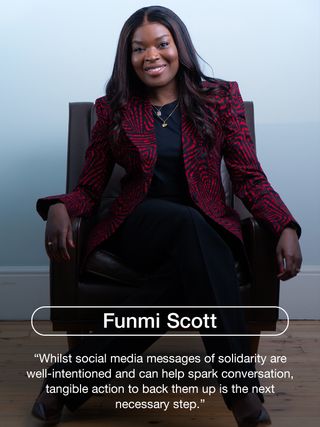
What does fashion mean to you?
For me, fashion is about expressing yourself, telling your story with confidence, be it how you feel that day or an expression of your heritage. Many of the Untapped Creatives brands champion this spirit of inclusivity and expression within fashion, bringing designs to the British luxury market that fuse elements of traditional African cultures with Western styles. This is what fashion should be about: feeling comfortable and expressing your individuality, identity and uniqueness.
What have you achieved in the last year that you're proud of?
Developing and finalising our Untapped Creatives collaboration with Selfridges whilst continuing to work as a lawyer has been my highlight of the past year. Negotiating preferential rates with Selfridges has allowed the 10 Untapped Creatives brands, which we have curated for them, access to premium retail space that they may otherwise have struggled to secure.
Consequently, the collaboration will herald a seminal moment within luxury retail, as buyers now have access to brands, like womenswear designer House of RG, now designing exclusive pieces for the Selfridges client to enjoy. Designer Dorothy Ogwuru takes great pride in producing Nigerian-inspired slow-fashion hand-beaded pieces in small runs with zero-waste designs. For me, this is the ultimate luxury and something I'm really proud to see come to fruition.
Currently, Black consumers are greatly underserved within the luxury sector, where there is still an assumption that the luxury consumer is white and, conversely, the incorrect assumption that white and non-Black customers will be unable to relate to Black brands. The Untapped Creatives team is excited to bring Black-owned brands to the attention of all Selfridges customers, who may not have otherwise discovered these brands. Personally, I am thrilled that we have launched in-store and online with a campaign backed by Selfridges, which I believe to be rather rare in this space.
In your opinion, did the events of the last year—George Floyd and the Black Lives Matter protests—impact your career going forward? Were any changes felt in the industry?
I see the Black Lives Matter protests as a key turning point for all of us. More people are now prepared to listen and support calls for greater diversity and inclusivity—not only within fashion and retail but also within wider society. We were pleased at Untapped Creatives to see brands and retailers launch initiatives to improve diversity and inclusivity, particularly the launch of Selfridges's Diversity Board and its supportiveness with our collaboration. This clearly signals to all consumers that brands are serious about working to make sure their consumers have access to Black-owned brands in both their product ranges and their core brand messaging. This has been compounded by the success of the Black Pound Day initiative and the greater focus in the media on shining a light on Black-owned brands. That being said, whilst change has definitely occurred and narratives around diversity and inclusivity have evolved noticeably, retail still has a long way to go before truly being able to claim full equity and parity for Black-owned brands.
A year later, what actions would you like to see beyond performative social media posts going forward?
With Untapped Creatives' work in the luxury retail sector, we would like to see more premium and luxury retailers making serious and tangible commitments to improving diversity, inclusivity and ESG [environmental, social, and corporate governance]. Whilst social media messages of solidarity are well intentioned and can help spark conversation, tangible action to back them up is the next necessary step.
We would like to see the luxury sector challenge some of the underlying assumptions unfortunately still held by some that Black-owned brands are somehow not considered premium and that the luxury consumer is always white.
We would also love for the luxury space to embrace Afro-Luxe. Afro-Luxe is a term coined by Untapped Creatives and is used to describe the growing trend of art that illuminates the creativity and elegance of Africa and Black people across the diaspora and ensures that the beauty and luxury of African artisans and craftsmanship are seen, appreciated and presented by a wider audience. Features showcasing African-inspired work and craftsmanship will go a long way in highlighting the luxury and detail behind their processes and promote African artisans in the same way as those of European countries. Where we understand the beauty of Italian leather goods, it would be wonderful to understand the luxury and beauty of leather handcrafted work from the likes of Mali or Nigeria.
Changing these entrenched attitudes is key to rectifying the current ethnic and racial imbalance within the luxury sector and moving towards positive storytelling celebrating Black creativity in all its forms.
We understand that these next steps can be challenging on a practical level, and that challenge is a pain point Untapped Creatives aims to solve for premium retailers and their buyers. My hope for Untapped Creatives and our Afro-Luxe concept is to be an effective conduit and build upon wider societal momentum within the diversity and inclusivity spaces. Untapped Creatives will keep championing, nurturing and opening doors for Black-owned luxury lifestyle brands to reach their full potential and be seen in the retail spaces they truly belong in.
Black-owned fashion recommendation:
House of RG Adaku Long-Sleeved Embellished Mini Dress (£1850). Having Nigerian heritage, I have a special appreciation for the way Dorothy fuses influences from her Nigerian heritage into Western-style dresses. Nigerians love colour and opulence. I love the craftsmanship, detailing and colour in House of RG's Capsule Collection 2021, which is perfect for social occasions as we enjoy the reopening of hospitality… I might even just wear it to Tesco!"
Nicole Ocran, Digital Fashion Creator, Co-Founder of The Creative Union, Host of Mixed Up Podcast
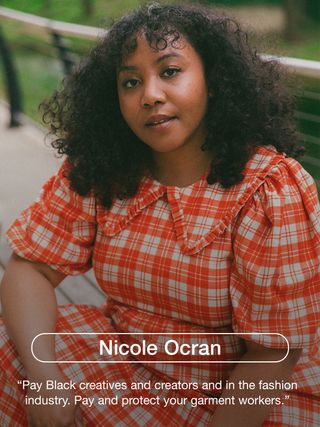
What does fashion mean to you?
Fashion is so meaningful to me because it's how I spend my days. I get dressed every morning, and it's my favourite time of day, deciding what it is I'm going to wear and how I choose to express myself to the world.
What have you achieved in the last year that you're proud of?
Last year was a big year for me despite the pandemic. I went full-time freelance in my career, I started my podcast, Mixed Up, with my co-host Emma Slade Edmondson and cultivated an incredible community to talk about the mixed-race identity. Through our podcast, we were also able to land the deal for our book, The Half of It, out with 4th Estate next summer.
In your opinion, did the events of the last year—George Floyd and the Black Lives Matter protests—impact your career going forward? Were any changes felt in the industry?
It impacted my career in the way that I suddenly had a lot of eyes on me. When people began sharing my page and people were looking for more Black creatives to follow on social media, I had a sudden influx of followers. It was overwhelming for me in a number of ways, namely the feeling that I had to show up and educate people during such an emotional upheaval for the community. I even had brands reach out to me to personally apologise for "not doing enough," in their words. It's a strange feeling to feel responsible for the entirety of the Black community and to essentially be called upon to speak on its behalf.
A year later, what actions would you like to see beyond performative social media posts going forward?
My feeling is you should utilise your privilege in the ways that can leave the most lasting and relevant impact, whether that's time, money or power. When it comes to brands, agencies and larger corporations, they are in abundance of all of those things. Pay Black creatives and creators, and in the fashion industry, pay and protect your garment workers.
Black-owned fashion recommendation:
My friend Ngoni Chikwenengere has an incredible womenswear label that is size inclusive and sustainably made called We Are Kin. Her pieces are chic, timeless and fashion-forward—slow fashion at its finest!
Charlotte Williams, Founder of SevenSix Agency
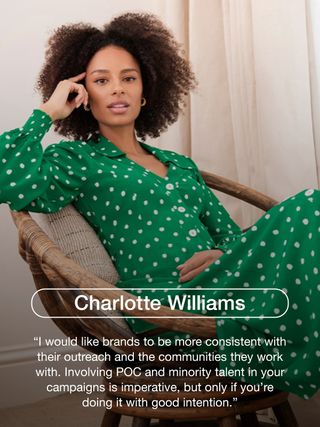
What does fashion mean to you?
For me, I see fashion and identity tightly linked. The trends we follow, the colours and prints we choose to wear are a visual representation of our story and our personalities. I grew up with TV shows like Sex and the City and Girlfriends, where I saw women wearing amazing outfits that showcased who they are, and I think a lot of my fashion decisions today are still linked to those women.
What have you achieved in the last year that you're proud of?
My biggest achievement, hands down, is building my amazing team. This past year has been tough, but it showed me that Team SevenSix was really built to last!
In your opinion, did the events of the last year—George Floyd and the Black Lives Matter protests—impact your career going forward? Were any changes felt in the industry?
A mixture of factors from last year really springboarded SevenSix. First off, we had the pandemic, which brought a lot of new clients looking for help in digital marketing and influencer marketing. Then, George Floyd's murder and the protests, educational pieces and mindset shifts that came with it encouraged brands and fellow agencies to wake up and look at their businesses. As we were one of the few agencies in the UK that focused on inclusive marketing and a hub for influencers who are people of colour, we were right at the top of everyone's Google search!
A year later, what actions would you like to see beyond performative social media posts going forward?
Last summer, we saw a lot of urgency around finding and working with Black creators. We've definitely seen a drop in the urgency and a lot of brands moving on from who they worked with a year ago and finding replacements for said Black talent. I would like brands to be more consistent with their outreach and the communities they work with. Involving POC and minority talent in your campaigns is imperative, but only if you're doing it with good intention.
You can watch Charlotte Williams on Do Black Lives Still Matter? on BBC iPlayer.
